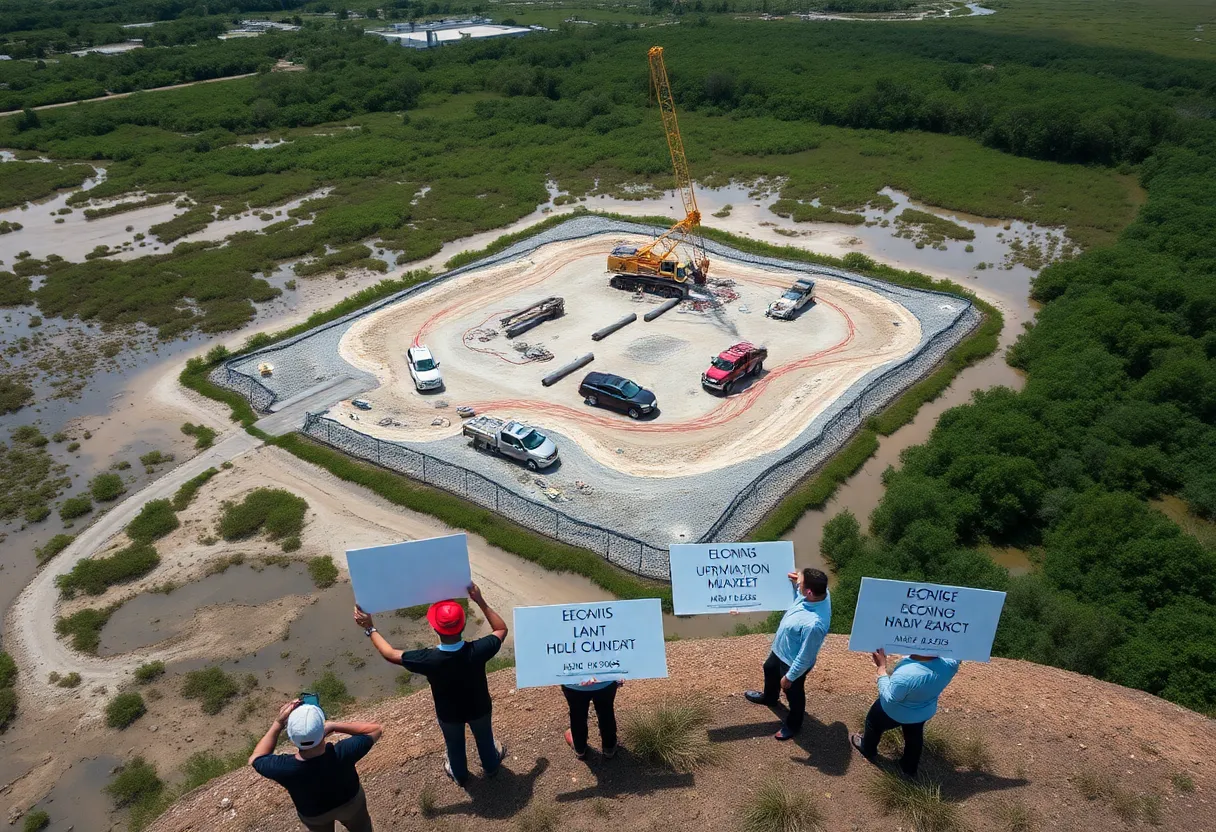Miami, Florida, August 13, 2025
News Summary
A federal judge in Miami will soon hear arguments from environmental groups and the Miccosukee Tribe seeking to halt construction at an immigrant detention center, dubbed ‘Alligator Alcatraz’. The case raises significant concerns over potential environmental violations impacting sensitive wetlands and native species. While a temporary injunction is currently in place, the facility continues to operate for immigration enforcement. Legal challenges highlight the complicated jurisdictional aspects and constitutional rights issues surrounding the detainees at this rapidly constructed facility in the Florida Everglades.
Miami, Florida – A federal judge will soon hear closing arguments on a case seeking to halt construction at an immigrant detention center, commonly referred to as “Alligator Alcatraz,” amid rising environmental concerns. The proceedings will address potential breaches of environmental laws related to the facility situated in the Florida Everglades.
U.S. District Judge Kathleen Williams previously issued a temporary halt on new construction for a span of two weeks while witness testimonials were evaluated. However, this order does not impede ongoing law enforcement or immigration enforcement operations at the detention center, which is currently home to hundreds of detainees.
The detention facility, which was rapidly built at a rarely utilized airport training site two months ago, has a capacity to hold up to 3,000 detainees with temporary tent structures. The judge’s temporary injunction specifically prohibits new industrial lighting installation and restricts additional paving, filling, excavation, fencing, or construction of new buildings.
Environmental organizations and the Miccosukee Tribe have initiated a preliminary injunction aimed at halting both operations and further construction of the facility. Their concerns primarily focus on the potential damage to environmentally sensitive wetlands that could endanger habitats of protected plant and animal species, potentially reversing extensive environmental restoration initiatives.
Witnesses for the plaintiffs testified that the facility breaches the National Environmental Policy Act, a law mandating federal environmental assessments for significant construction projects. In opposition, attorneys representing state and federal authorities argued that the facility resides under state jurisdiction and asserted that federal environmental reviews are inapplicable.
Judge Williams acknowledged that the detention center represents a partnership between state and federal entities. Witnesses disclosed that since construction commenced, approximately 20 acres of asphalt have been laid down, raising concerns that this could lead to increased water runoff and contamination of adjacent wetlands in the Everglades region.
Testimonies indicated that nutrient runoff could infiltrate tribal lands, critically impacting vegetation growth and endangering both fish populations and wildlife movements. The Miccosukee Tribe fears that human activity could significantly reduce game animals, therefore compromising their traditional hunting and fishing practices.
In defense of the facility, David Kerner, executive director for the Department of Highway Safety and Motor Vehicles, articulated that state troopers are authorized to detain undocumented migrants in accordance with a Homeland Security agreement and emphasized that the center aims to ease overcrowding in existing detention facilities.
Legal representatives for state and federal agencies had sought to dismiss or reassign the injunction request, asserting a misapplication in jurisdiction. The judge is yet to make a decision on this jurisdictional contention.
In addition to this legal challenge, another lawsuit is underway, with Judge Rodolfo Ruiz anticipated to consider a motion for a preliminary injunction related to detainees’ constitutional rights on August 18. A response deadline for a potential class action lawsuit related to this issue is set for September 23.
This second lawsuit alleges that detainees are facing violations of their constitutional rights due to challenges such as limited attorney access, detention without charges, and canceled bond hearings.
Plans are in the works for a second detention facility to be developed in northern Florida, specifically at a National Guard training site, labeled as the “North Detention Facility” in state documentation. President Donald Trump has previously visited the detention site, highlighting it as an exemplary model for stricter deportation measures, while state officials stress its importance in deterring illegal immigration.
The facility can initially house up to 3,000 detainees, with provisions for future expansion to accommodate as many as 5,000. Concerns persist from various groups including immigrant advocates, environmental activists, and Indigenous communities over its environmental repercussions and proximity to culturally significant areas.
Frequently Asked Questions
What is the main concern regarding the Alligator Alcatraz detention center?
The primary concern revolves around potential environmental violations and threats to sensitive wetlands, habitats for protected species, and traditional lands of Indigenous communities.
Who is involved in the opposition to the detention center’s construction?
Environmental groups, the Miccosukee Tribe, and legal representatives have opposed the construction, seeking to halt operations due to environmental concerns.
What legal actions are being taken against the detention center?
There are multiple legal challenges, including a temporary halt to construction and a second lawsuit addressing constitutional rights violations of detainees.
What has been the response of state and federal agencies regarding the criticisms?
Representatives from state and federal agencies contend that the facility operates under state jurisdiction, indicating that federal environmental reviews may not apply to the project.
What future plans exist for additional detention facilities in Florida?
Plans are underway for another facility in northern Florida, recognized in state records as the “North Detention Facility.”
Key Features of the Alligator Alcatraz Detention Center
| Feature | Details |
|---|---|
| Location | Florida Everglades, at a training airport |
| Capacity | Initially 3,000, expandable to 5,000 |
| Construction Start Date | Two months ago |
| Environmental Concerns | Impact on wetlands, protected species, and Indigenous lands |
| Legal Status | Temporary halt on construction pending court decision |
| Future Plans | Another facility to be constructed in Northern Florida |
Deeper Dive: News & Info About This Topic
HERE Resources
Federal Judge Halts Construction of Immigrant Detention Center
Deportation Controversy Surrounds Brown Medicine Professor
Florida’s New Immigration Detention Center: What You Need to Know
Tragedy During Immigration Raids at Cannabis Farms
Trump Opens ‘Alligator Alcatraz’ Immigration Facility Amid Controversy
Controversial Plans for New Immigrant Detention Facility in Florida
ICE Raids Lead to Arrests of Illegal Immigrants in Bethlehem
Florida’s New ‘Alligator Alcatraz’ Immigration Facility Approved
Federal Judge Approves Release for Detained Immigrant
Nationwide Protests Erupt Against Immigration Raids
Additional Resources
- CNN: What is Alligator Alcatraz in Florida?
- Wikipedia: Immigration Detention in the United States
- The New York Times: Chaotic Early Days Inside Florida’s Alligator Alcatraz
- Google Search: Alligator Alcatraz
- ABC News: Florida Attorney General Proposes Alligator Alcatraz Migrant Detention
- Google Scholar: Alligator Alcatraz Detention Center
- AP News: Florida’s Alligator Alcatraz Immigration Detention Issues
- Encyclopedia Britannica: Immigration Detention
- AP News: History of Florida’s Alligator Alcatraz
- Google News: Florida Alligator Alcatraz
Author: STAFF HERE PHILADELPHIA WRITER
The PHILADELPHIA STAFF WRITER represents the experienced team at HEREPhiladelphia.com, your go-to source for actionable local news and information in Philadelphia, Philadelphia County, and beyond. Specializing in "news you can use," we cover essential topics like product reviews for personal and business needs, local business directories, politics, real estate trends, neighborhood insights, and state news affecting the area—with deep expertise drawn from years of dedicated reporting and strong community input, including local press releases and business updates. We deliver top reporting on high-value events such as Mummers Parade, Philadelphia Flower Show, and Thanksgiving Day Parade. Our coverage extends to key organizations like the Greater Philadelphia Chamber of Commerce and United Way of Greater Philadelphia, plus leading businesses in telecommunications, food services, and healthcare that power the local economy such as Comcast, Aramark, and Children's Hospital of Philadelphia. As part of the broader HERE network, we provide comprehensive, credible insights into Pennsylvania's dynamic landscape.





